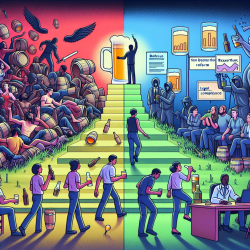Binge drinking remains a significant public health concern in the United States, contributing to premature mortality, injuries, and a myriad of health issues. While federal efforts exist to regulate alcohol consumption, the responsibility largely falls on individual states to establish policies aimed at mitigating these harms. Recent research has highlighted the importance of understanding and improving state alcohol policy environments to effectively reduce excessive alcohol consumption.
The Role of State Alcohol Policies
The study titled "Evaluating the relationship between binge drinking rates and a replicable measure of U.S. state alcohol policy environments" provides valuable insights into how state-level policies can influence binge drinking behaviors. The researchers developed a State Alcohol Policy Score (SAPS), which serves as a comprehensive measure of a state's regulatory environment concerning alcohol. This score is based on various policy domains, including alcohol pricing, sales restrictions, driving-related laws, and underage drinking laws.
Key Findings
- A 10-percentage point increase in the SAPS is associated with a 9% reduction in the odds of binge drinking.
- This reduction is consistent across genders and most age and race subgroups.
- Stronger state alcohol policies correlate with narrower gender gaps in binge drinking behaviors.
Implications for Practitioners
For practitioners working to reduce binge drinking rates, understanding the impact of state policies is crucial. The SAPS offers a replicable and transparent tool for evaluating the effectiveness of these policies. By leveraging this score, practitioners can:
- Advocate for Stronger Policies: Use SAPS data to push for more comprehensive alcohol regulations in states with weaker scores.
- Identify Gaps: Pinpoint areas where current policies may be lacking or could be enhanced to better address binge drinking.
- Tailor Interventions: Develop targeted interventions that align with specific policy strengths or weaknesses within a state.
Encouraging Further Research
The findings from this study underscore the need for ongoing research into the nuances of state alcohol policy environments. Practitioners are encouraged to explore further:
- The impact of individual policy components on binge drinking behaviors.
- The effectiveness of policy enforcement at both state and local levels.
- The role of demographic and socio-economic factors in shaping policy outcomes.
Conclusion
The research provides compelling evidence that robust state alcohol policies can significantly reduce binge drinking rates. By adopting evidence-based approaches and continuously refining policy measures, states can make substantial progress in curbing excessive alcohol consumption and its associated harms. Practitioners play a vital role in this process by advocating for effective policies and implementing informed interventions.
To read the original research paper, please follow this link: Evaluating the relationship between binge drinking rates and a replicable measure of U.S. state alcohol policy environments.










